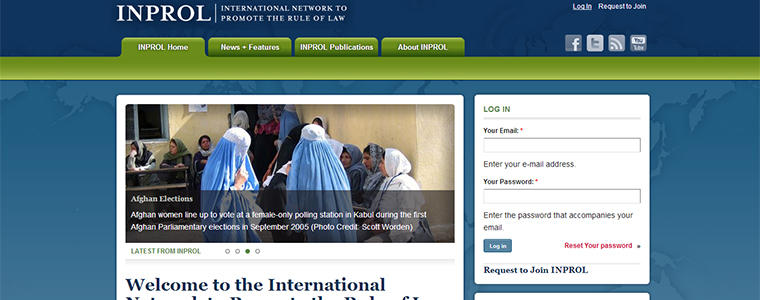The U.S. Institute of Peace (USIP) and its partners this month have re-launched a unique, web-based global network of rule-of-law professionals.

The International Network to Promote the Rule of Law (INPROL), established in 2007, is an online community of some 1,800 rule-of-law practitioners from 80 countries and about 300 organizations. The INPROL website, http://inprol.org/, was revamped this month to increase its usefulness and versatility.
“It rolls out some new and exciting features, like the Afghanistan Country Page, which provides an overview of rule-of-law issues and the justice system in Afghanistan, and a Dialogue Space that encourages innovation and forward-thinking in the rule-of-law field,” said Vivienne O’Connor, INPROL’s director and senior program officer in USIP’s Rule of Law Center. INPROL’s online digital library was also expanded from 800 publications to more than 3,000.
INPROL is a consortium of partners—spearheaded by USIP but including the U.S. State Department’s Bureau of International Narcotics and Law Enforcement (INL), the Center of Excellence for Police Stability Unit in Italy; the Strategic Police Matters Unit of the Organization for Security and Cooperation in Europe (OSCE); William & Mary School of Law; the Pearson Peacekeeping Center; and the International Institute for Law and Human Rights. INPROL’s members include policymakers, practitioners and researchers who are working on rule-of-law reform.
"We are a benchmark for communities of practice in the peacebuilding field," said Christina Murtaugh, USIP program officer and INPROL’s rule of law facilitator.
INPROL helps rule of law professionals–either national stakeholders or those from the international community—solve the rule of law problems they encounter in the post-conflict or transitional countries they are working in. They can solicit advice from fellow INPROL members by posting a question in the online discussion forums; receive, in some cases, specific research memoranda that are drafted by USIP staff in response to queries; access INPROL’s Digital Library; and stay abreast of developments in the field.
In addition, INPROL tries to foster coordination and practical contact within a fast-evolving field. Last, it also encourages innovation by providing a dialogue forum where members can discuss the big-picture issues that face the rule of law field and work together to develop new approaches to them.
INPROL efforts “bring together experts, ideas and experiences in the area of rule of law. Whenever I need any help, my first stop is the INPROL website,” said INPROL member Zafar Gondal, who has worked with the U.S. Agency for International Development and with INL.
O’Connor described INPROL as providing specialists who are trying to build the rule of law in post-conflict zones and elsewhere focused networking as well as “quality-controlled documents, resources and support--not to mention access to peers and experts in the field.” INPROL has taken on a research and knowledge-management role for the rule-of-law community that is not found elsewhere, filling a void for most organizations because they lack either a research support unit or one for knowledge management, she said.
Since its founding, INPROL has received queries related to Afghanistan, Iraq, Nepal, Azerbajian, South Sudan, East Timor, Kosovo, Egypt, Pakistan, Southern Africa, Niger and Haiti. The questions have come from a wide range of individuals and organizations, including the State Department, the U.S. Agency for International Development, the European Union Police Mission in Afghanistan, NATO, United Nations peacekeeping missions, the OSCE, the U.N.’s Department of Peacekeeping Operations, and the UK’s Department for International Development, among others.
INPROL has proved helpful on a variety of issues. For instance, it responded with a detailed research memo to a Swedish police officer who, on a European Union mission, was advising Afghanistan’s Ministry of the Interior. The question was how to create a police ombudsman or complaints commission. The USIP-based INPROL team researched and wrote a memo that provided an overview of the range of options in establishing an independent ombudsman to monitor police conduct and the steps that would be required in establishing it.
In Nigeria, an international police adviser sought tools and training materials to develop the capacity of police and security forces for the effective policing of elections. The INPROL team reached out to experts and provided some timely research to that member, who was then able to offer more useful advice to a task force assisting the Nigerian police.
Just before the INPROL re-launch, a question came in about “interim security arrangements” that relates to developments in the Arab Spring countries, like Yemen, where opposition parties and the regime have agreed to share responsibilities for justice and security. In response, USIP-based staff is currently working on a research memo.
INPROL membership is rising, particularly in Afghanistan, where much of the recent growth has taken place. INPROL currently has more than 260 members with rule-of-law experience related to Afghanistan.
"We are an invaluable tool for rule-of-law practitioners and organizations, providing unique research and ‘reach-back’ support,” said O’Connor. “Our community is expanding day by day, and we welcome those working on justice and security issues, either as part of the international community or in their own countries, to join INPROL."